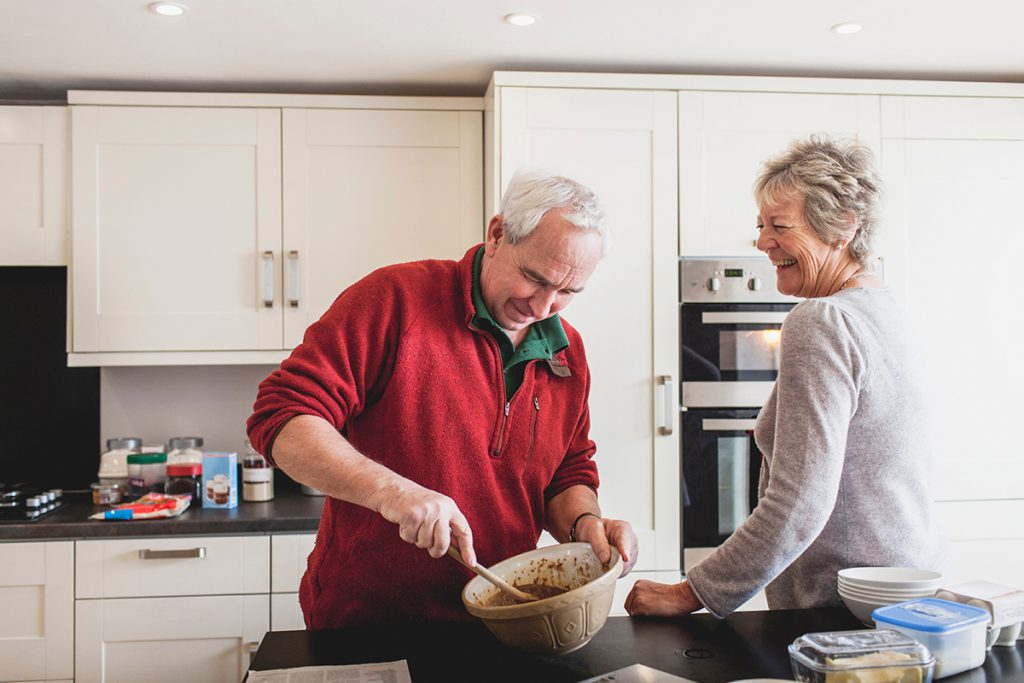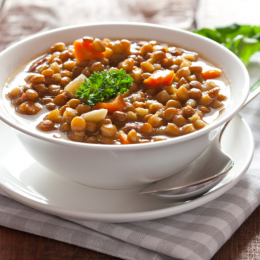7 Simple Tips That Will Make Your Baking Healthier
You don’t have to trade good taste for good nutrition. With these easy upgrades, your favorite baked treats just got better. Plus, a muffin recipe to try!

You might think desserts are a no-no when it comes to healthy eating. But there’s certainly room for the occasional treat in a balanced diet, especially if it’s a home-baked good.
Sweet treats can bring joy and make your diet more satisfying. And letting yourself indulge in a little something can help you stave off cravings that are harder to resist. Plus, the act of baking is a fun and relaxing project for many.
When you make your own treats, you also have more control over the ingredients. That means you can make your baked goods more nutritious while still getting that same great taste you’re looking for. All it takes is a few smart baking strategies.
Healthy eating and fitness go together! SilverSneakers classes and events are happening right now at participating gyms, online through SilverSneakers LIVE, and at community centers near you. Activate your free online account to get started.
Healthy Baking Tip #1: Swap in Whole Grains
Many baked goods call for all-purpose flour, a refined wheat flour that produces consistent results. Just one problem: the refining process strips away the wheat germ and bran. And that’s where most of wheat’s good nutrients are found.
Whole grain flour, on the other hand, keeps the germ and bran, and supplies a greater range of nutrients and extra dietary fiber. Research shows that whole grains may be better for your health than refined grains. A large 2023 review study in the American Journal of Clinical Nutrition found that eating whole grains, rather than refined grains, can assist in preventing early death from conditions like heart disease.
To make your baked goods a little more nutritious, try swapping in some whole grain flour like whole wheat, oat, spelt or rye. Whole grain flours have a coarser texture than all-purpose flour. To make cookies, muffins and cakes with the texture you’re used to, try replacing just half of the all-purpose flour with a whole-grain option. You likely won’t notice much of a difference.
Or do a full swap by using whole wheat pastry flour. Whole wheat pastry flour is made from lower protein soft spring wheat that creates lighter, less dense baked goods.
Recommended reading: What Are Ultra-Processed Foods—and Should You Avoid Them?
Healthy Baking Tip #2: Scale Back the Sugar
Baked desserts are usually packed with lots of added sugar. Most Americans eat too much added sugar, which can raise your risk for diabetes, heart disease, obesity, and more. The good news is that it’s easy to cut back on added sugar in your home-baked goods.
Many baked goods recipes call for more sugar than is necessary. Sometimes way more! Unless a recipe is written specifically to be lower in sugar, try reducing the amount of sugar called for by about 25%. Sometimes you can even cut back by 50% without noticing much of a difference. Experiment with your favorite recipes until you find your “sweet” spot.
Here is a pro tip: Give your reduced-sugar treats some time in the fridge before baking—even just 30 minutes will do. Chilling the batter increases caramelization, enhancing the flavor of the final product.
Healthy Baking Tip #3: Try a Natural Sweetener
Not only can you cut back on the amount of sugar, you can also try swapping the sweetener in a recipe for a healthier option. For some recipes, it is possible to replace most (if not all of) the granulated sugar with pureed dried fruit. This way you still get the sweetness you crave in your baked goods but with the benefit of added vitamins, minerals, and fiber.
Dried fruit can also make baked goods like muffins and cakes extra moist. That means you might be able to cut back on some of the oil or butter in a recipe, too, which can cut calories and fat. There is also the old trick of using applesauce in a recipe in place of some or all of the sugar and oil.
Dates, prunes, raisins, cranberries and cherries are good options for making fruit purees for baking. To make a fruit puree:
- Add the desired amount of dried fruit to a bowl.
- Just barely cover with boiling water.
- Let soak for about 20 minutes.
- Puree in a blender or food processor into a thick paste.
Keep in mind that the fruit puree will add more moisture than you’d get from granulated sugar. So you may need to adjust the amount of liquid from ingredients like milk.
Healthy Baking Tip #4: Experiment With Spices
Spices like cinnamon, ginger, nutmeg and cloves add cozy flavor to baked goods. They’ve also been shown to make sweet treats just as pleasurable even when their made with less sugar.
So when you cut back on the sugar in a recipe, consider going a little bigger on spices. They may trick your taste buds into thinking you are eating something sweeter and more indulgent.
And there could be some other health benefits to using extra spices in your baking. A recent study in the American Journal of Clinical Nutrition found that a diet high in spices can have greater anti-inflammatory powers than a diet that includes low levels of these calorie-free culinary wonders.
Recommended reading: 3 New Twists on Your Favorite Healthy Foods
Healthy Baking Tip #5: Downsize Your Portions
Portion control is always an uphill battle when it comes to eating dessert. A cake that should feed eight can easily end up turning into six or fewer servings if your slicing is generous.
For better portion control consider breaking out the muffin pan more often. Recipes like banana bread or carrot cake can almost always be divided up into individual muffin-sized portions.
Simply pour your batter into muffin cups instead of a cake or loaf pan. Now you’ll have a more reasonable 12 servings that are already pre-portioned. As a bonus, your mini desserts will bake faster, so you can enjoy the fruits of your labor sooner.
Healthy Baking Tip #6: Mix in Alternative Flours
For a more diverse nutritional and flavor profile of your baked goods consider adding a non-conventional flour into the mix. Options like almond flour or hazelnut flour can take down the carb count while also adding a pleasant nutty profile and beneficial fats.
Teff flour, which is great in any chocolate-based recipe like brownies, is higher in iron than most other flours. Quinoa flour adds extra protein while whole oat flour contains cholesterol-lowering soluble fiber.
Subscribe to our newsletter
It's quick and easy. You could be one of the 13 million people who are eligible.
Already a member? Click to discover our 15,000+ participating locations.
Follow Us
For the most part, you can start by swapping out about a quarter of the flour in a recipe with an alternative flour. So if you were going to use 2 cups of whole wheat pastry flour for a muffin recipe, experiment with 1 1/2 cups of regular flour and 1/2 cup almond flour and see if you like the results.
Healthy Baking Tip #7: Sneak in Veggies
Most of us should be eating more vegetables—why not look to your baking for an assist? To instantly increase the nutrient profile of baked goods, try mixing in a cup of shredded zucchini, carrot, parsnip or even beets. Riced cauliflower, which is available in the frozen vegetable section of supermarkets, is another good option. Mashed sweet potato or pumpkin puree are sweeter options that let you cut back on the amount of sugar and fat needed in a recipe, too.
These vegetables add moisture to your baked goods. And the flavor is mild enough that you won’t even notice them.
Depending on how much moisture there is in the veggies, you may want to reduce the liquids in the recipe a little bit. Check the consistency of the batter as you go. But for the most part, you can use veggies as a booster without subtracting much else.
Mocha Pumpkin Muffins
Put some of these tips to work with this muffin recipe. Dates and pumpkin give these chocolatey muffins all the sweetness they need, while whole wheat pastry flour and almond flour lend a nutritional upgrade.
You’ll need:
- 1/2 cup pitted dried dates
- 1/3 cup cocoa powder
- 1 cup brewed hot coffee
- 1 cup pumpkin puree
- 1/4 cup oil
- 1 teaspoon vanilla
- 2 eggs
- 1 1/4 cup whole wheat pastry flour
- 1/2 cup almond flour
- 1 tsp cinnamon
- 1 tsp baking powder
- 1/2 tsp baking soda
- 1/4 tsp salt
What to do:
- Preheat oven to 350°F.
- Place dates, cocoa powder, and hot coffee in a blender container and let rest 30 minutes.
- Add in pumpkin, oil and vanilla; blend until smooth.
- Blend in the eggs.
- Stir together whole wheat pastry flour, almond flour, cinnamon, baking powder, baking soda and salt in a large bowl.
- Add date mixture and stir until everything is moist.
- Divide among 12 standard-sized greased or paper lined muffin cups and bake for 20 minutes, or until muffins are set in the center.
- Let cool for 5 minutes before unmolding.
Recipe by Matthew Kadey, R.D.
See our sources:
Study on whole grains and mortality: The American Journal of Clinical Nutrition
Adding spices makes reduced-sugar foods taste sweeter: Journal of Food Science
Anti-inflammatory effects of spices: The American Journal of Clinical Nutrition
Check Your SilverSneakers Eligibility Instantly
SilverSneakers members can go to thousands of nationwide gyms and fitness locations, plus take SilverSneakers LIVE online classes that are designed for all fitness levels and abilities. If you have a Medicare Advantage plan, it may include SilverSneakers — at no additional cost. Check your eligibility instantly here.
Already a member? Get your SilverSneakers member ID and exclusive fitness and wellness content by activating your online account here.
Not eligible for SilverSneakers? You can still get 200+ free SilverSneakers On-Demand videos and stay in touch with us by creating your online account.




